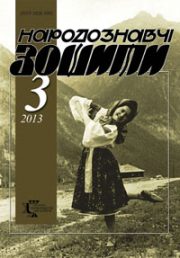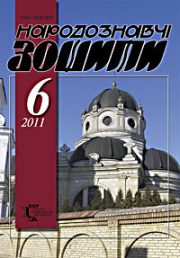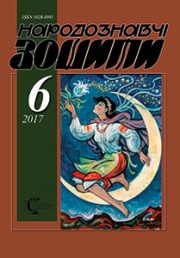The Ethnology Notebooks. 2019, № 5 (149), 1200—1204
UDK 398.21(=161.2):050(438)”187/191”
DOI https://doi.org/10.15407/nz2019.05.1200
UKRAINIAN FOLKTALES IN POLISH ETHNOGRAPHIC EDITION «ZBIOR WIADOMOSCI DO ANTROPOLOGII KRAJOWEJ»
DEMEDYUK Мaryna
ORCID ID: https://orcid.org/0000-0003-4415-002X
Candidate of philology sciences (= Ph.D. in philology),
Researcher at the Institute of Ethnology
of the National Academy of Sciences of Ukraine,
Dement of Folkloristic,
15, Svobody Avenue, 79000, Lviv, Ukraine
e-mail: mdemedyuk@gmail.com
Abstract. One of the central problems in Ukrainian fairytale researches is the accumulation and edition of scientifically valuable folktale texts. Contemporary studies require an appeal to folklore-ethnographic collections of Ukrainian narratives, published in foreign periodicals. The purpose of the proposed research is to find out the specifics of folklore materials contained in the Polish periodicals of the late 19th and early 20th centuries. The subject of the study is the scientific journal «Zbior wiadomosci do anthropologii krajowej». The methodological basis of the work is the principles of objectivity and historicism of folklore. The methodology of Ukrainian and foreign folklorists and ethnographers was used for attribution of the featured texts (I. Franko, V. Hnatyuk, A. Aarne, L. Mushketik, etc.).
The article analyzes the Ukrainian folk tales contained in the Polish serial of the late 19th — early 20th enturies. The specifics of the submission of folklore material by Polish collectors and organizers of editions (Z. Moshyns’ka, O. Kolberg, E. Rulikovskyy, Ch. Neyman) have been clarified. Texts of folktales are presented in Latin transcription, mostly preserving the lexical and phonetic features of the area. However, some of the tales were translated into Polish, which resulted in the loss of the authentic sound of the narrative. The scientific value of the contained texts and their importance for Ukrainian fairytale are traced. The basic structural elements of the text have been preserved: typical initial, medial and final formulas, ornamental means (constant epithets and comparisons, reduced-frivolous vocabulary, etc). It is important that most of the collections reproduce the tradition of individual regions (Polisia, Podillya, Dnipro region).
Keywords: Ukrainians, Polish researchers, folktale, folklore plot.
Received 27.09.2019
REFERENCES
Kulish, P. (1857). Notes on Southern Russia (Vol. 2). St. Petersburg. In A. Jacobson’s Typography [in Russian].
Drahomanov, M. (1876). Ukrainian folktales and stories. Kyiv [in Russian].
Rozdol’sky, O., & Franko, I. (1895). Galician folktales. In Ethnographic collection: 40 volumes (Vol. 1). Lviv [in Ukrainian].
Hnatyuk, V. (1916). Ukrainian folk tales (Animal epic) (Vol. I—II). In Ethnographic collection (Vol. 37—38). L’viv [in Ukrainian].
Hnatyuk, V. (1910). Ethnographic materials from Hungarian Rus (Volume V: Tales from Bachka). In Ethnographic collection (Vol. 29). L’viv [in Ukrainian].
Krzyїanowski, J. (Ed.). (1965). Dictionary of Polish Folklore. Warszawa: Wiedza Powszechna [in Polish].
Rulikowski, E. (1879). Еtnografic notes from Ukraine. In Zbior wiadomosci do anthropologii krajowej (Vol. 3, pp. 62—89). Krakow [in Polish].
Neumann, C. (1884). Materials from the Pliskowa districts w Powiecie Lipowiecki. In Zbior wiadomosci do anthropologii krajowej (Vol. 8, pp. 234—245). Krakow [in Polish].
Kolberg, O. (1889). Fables from Polesia. In Zbior wiadomosci do anthropologii krajowej (Vol. 13, part 3, pp. 200—207). Krakow [in Polish].
Moszynska, J. (1885). Fables and puzzles of the Ukrainians. In Zbior wiadomosci do anthropologii krajowej (Vol. 9, pp. 73—160). Krakow [in Polish].
Demedyuk, M. (2016). Christian motives in Ukrainian folk tales. The Ethnology Notebooks, 3, 704—709. L’viv [in Ukrainian].
Franko, I. (1980). A note on the ethnography of the Ukrainian people in Volyn. In Franko, I. Collection of works: in 50 vol. (Vol. 27, pp. 210—215). Kyiv [in Ukrainian].
Hrushevsky, M. (2008) Works: in 50 volumes (Vol. 14, pp. 36—37). Lviv: World [in Ukrainian].






